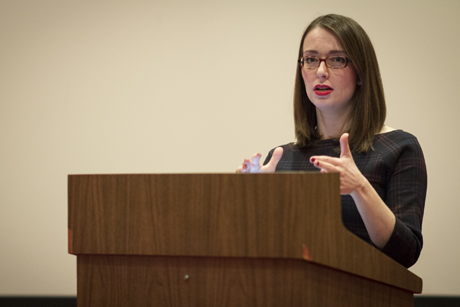Panelists: A new Cold War over Ukraine is unlikely
By Kara Beckman

As tensions between the West and Russia escalate over Ukraine, some fear that the struggle for control may pull the United States and Russia into a new Cold War.
While the crisis in the Ukraine has become an international concern, the conflict was initially a domestic issue, said Julia Ioffe, a senior editor at The New Republic, in a keynote address at the campus event, “Ukraine, Putin and the New Cold War,” March 14.
The problems began this past fall after Ukrainian President Viktor Yanukovych refused to sign a trade agreement with the European Union (EU), preferring to pursue closer ties with Russia instead. Ensuing protests in Kiev were targeted against Yanukovych and his corrupt presidency, she said.
After dozens of protesters were killed in January, and Yanukovych fled the country in February, the Ukrainian Parliament voted to impeach him, established an interim government and set a date for new presidential elections. This was an internal political issue, Ioffe noted, and Ukraine was attempting to deal with it internally. Russian President Vladimir Putin, however, seized the opportunity to step in and “defend the Russian-speaking population of Crimea” as a front for his true goals – taking back territory that he never considered “a real country,” she said.
Ioffe noted that the generational divides in the region have been exacerbated by Putin, who has brought in Russian citizens to incite tensions in Crimea and drum up support within the region to rejoin Russia.
The main issue with dealing with Putin is that he “has his own kind of logic,” said Ioffe. And the problem with Western intervention, the panelists agreed, is that there are only two potentially viable actions.
The United States and the EU could try to neutralize the crisis, but that may not be possible due to the rapidly deteriorating situation in Russia. Since the start of the crisis, Putin has been mobilizing for war, and cracking down on anyone opposing the action. He has blocked the Internet, dismantled most of the independent media sources and begun charging fines for “Russo-phobia,” Ioffe said. There is a very real fear among Russian citizens of a civil war, Ioffe explained.
Nor are sanctions against the country an option. The EU is reluctant to punish Russia economically, as the majority of the EU’s energy comes from Russia through the Ukraine.
Panelist Professor Fredrik Logevall noted that many pundits claim that Obama’s stance on Syria and the attack in Benghazi have given Putin the impression that America is weak. This is not the case, said Logevall: “A state’s past behavior has little to no effect on its reputation.” If anything, “Putin acted out of a sense of his own weakness.”
So will the Crimean crisis be the catalyst for a new Cold War? No, said visiting scholar and panelist Kateryna Pishchikova. The idea of a “Cold War” doesn’t reflect the modern global reality, she said, noting that international diplomacy is far better now than it was during the Cold War.
Whether or not Putin gains Crimea, he has effectively lost the Ukraine, the panelists explained. Whether this will mean serious political changes in Russia in the near future is dependent primarily on the economy, Ioffe said. Only an extended “economic malaise” could topple Putin from the presidency. Until then, Ioffe warned, “things can always get worse.”
The event was presented by the Cornell Democrats and the International Affairs Forum. Cornell Professor Matthew Evangelista mediated the panel, and visiting scholar Lena Surzhko-Harned also served as a panelist.
Kara Beckman ’17 is a writer intern for the Cornell Chronicle.
Media Contact
Get Cornell news delivered right to your inbox.
Subscribe